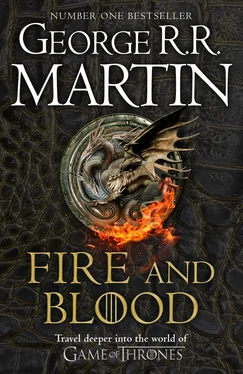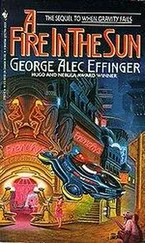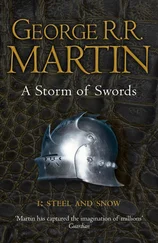There we must leave Queen Rhaena for a time, whilst we cast our eyes eastward again toward King’s Landing and Dragonstone, where the regent and king remained at odds.
Vexing as the issue of the king’s marriage was to Queen Alyssa and Lord Rogar, it must not be thought that it was the only matter that concerned them during their regency. Coin, or rather the lack of coin, was the Crown’s most pressing problem. King Maegor’s wars had been ruinously expensive, exhausting the royal treasury. To refill his coffers Maegor’s master of coin had raised existing taxes and imposed new ones, but these measures brought in less gold than anticipated and only served to deepen the anathema with which the lords of the realm regarded the king. Nor had the situation improved with the ascension of Jaehaerys. The young prince’s coronation and his mother’s Golden Wedding had both been splendid affairs that had done much to win him the love of lords and smallfolk alike, but all that had come at a cost. An even larger expense loomed ahead; Lord Rogar was determined to complete work on the Dragonpit before handing the city and the kingdom over to Jaehaerys, but the funds were lacking.
Edwell Celtigar, Lord of Claw Isle, had been an ineffectual Hand for Maegor the Cruel. Given a second chance under the regency, he proved to be an equally ineffectual master of coin. Unwilling to offend his fellow lords, Celtigar instead decided to impose new taxes on the smallfolk of King’s Landing, who were conveniently close at hand. Port fees were tripled, certain goods were to be taxed both coming into and out of the city, and new levies were asked of innkeeps and builders.
None of these measures had the desired effect of filling up the treasury vaults. Instead building slowed to a halt, the inns emptied, and trade declined notably as merchants diverted their ships from King’s Landing to Driftmark, Duskendale, Maidenpool, and other ports where they might evade taxation. (Lannisport and Oldtown, the other great cities of the realm, were also included in Lord Celtigar’s new taxes, but there the decrees had less effect, largely because Casterly Rock and the Hightower ignored them and made no effort to collect.) The new levies did, however, serve to make Lord Celtigar loathed throughout the city. Lord Rogar and Queen Alyssa received their share of opprobrium as well. Another casualty was the Dragonpit; the Crown no longer had the funds to pay the builders, and all work on the great dome ceased.
Storms were gathering to both north and south as well. With Lord Rogar occupied in King’s Landing, the Dornishmen had grown bold, raiding more frequently into the marches, even troubling the stormlands. There were rumors of another Vulture King in the Red Mountains, and Lord Rogar’s brothers Borys and Garon insisted they did not have the men and money required to root him out.
Even more dire was the situation in the North. Brandon Stark, Lord of Winterfell, had died in 49 AC, not long after his return from the Golden Wedding; the journey, the northmen said, had asked too much of him. His son Walton succeeded him, and when a sudden rebellion broke out in 50 AC amongst the men of the Night’s Watch at Rimegate and Sable Hall, he gathered his strength and rode to the Wall to join the leal watchmen in putting them down.
The rebels were former Poor Fellows and Warrior’s Sons who had accepted clemency from the boy king, led by Ser Olyver Bracken and Ser Raymund Mallery, the two turncloak knights who had served in Maegor’s Kingsguard before abandoning him for Jaehaerys. The Lord Commander of the Watch, unwisely, had given Bracken and Mallery command of two crumbling forts, with orders to restore them; instead the two men decided to make the castles their own seats and establish themselves as lords.
Their uprising proved short-lived. For every man of the Night’s Watch who joined their rebellion, ten remained true to their vows. Once joined by Lord Stark and his bannermen, the black brothers retook Rimegate and hanged the oathbreakers, save for Ser Olyver himself, who was beheaded by Lord Stark with his celebrated blade Ice. When word reached Sable Hall, the rebels there fled beyond the Wall in hopes of making common cause with the wildlings. Lord Walton pursued them, but two days north in the snows of the haunted forest, he and his men were set upon by giants. It was written afterward that Walton Stark slew two of them before he was dragged from his saddle and torn apart. His surviving men carried him back to Castle Black in pieces.
As for Ser Raymund Mallery and the other deserters, the wildlings gave them a cold welcome. Rebels or no, the free folk had no use for crows. Ser Raymund’s head was delivered to Eastwatch half a year later. When asked what had befallen the rest of his men, the wildling chieftain laughed and said, “We ate them.”
Brandon Stark’s second son, Alaric, became the Lord of Winterfell. He would rule the North for twenty-three years, an able man though a stern one … but for a long while he had no good to say of King Jaehaerys, for he blamed the king’s clemency for his brother Walton’s death, and was oft heard to say that His Grace should have beheaded Maegor’s men rather than sending them to the Wall.
Far removed from the troubles in the North, King Jaehaerys and Queen Alysanne remained in their self-imposed exile from the court, but they were anything but idle. Jaehaerys continued his rigorous training regimen with the knights of his Kingsguard every morn, and devoted his evenings to poring over accounts of the reign of his grandsire Aegon the Conqueror, on which he wished to model his own rule. Dragonstone’s three maesters assisted him in these inquiries, as did the queen.
As the days passed, more and more visitors made their way to Dragonstone to talk with the king. Lord Massey of Stonedance was the first to appear, but Lord Staunton of Rook’s Rest, Lord Darklyn of Duskendale, and Lord Bar Emmon of Sharp Point came hard on his heels, followed by the Lords Harte, Rollingford, Mooton, and Stokeworth. Young Lord Rosby, whose father had taken his own life when King Maegor fell, turned up as well, sheepishly pleading for the young king’s forgiveness, which Jaehaerys was pleased to grant. Though Daemon Velaryon, as the Crown’s lord admiral and master of ships, was in King’s Landing with the regents, that did not prevent Jaehaerys and Alysanne from flying their dragons to Driftmark and touring his shipyards, escorted by his sons, Corwyn, Jorgen, and Victor. When word of these meetings reached Lord Rogar in King’s Landing he grew furious and went so far as to ask Lord Daemon if the Velaryon fleet could be used to prevent these “lords lickspittle” from crawling to Dragonstone to curry favor with the boy king. Lord Velaryon’s reply was blunt. “No,” he said. The Hand took this as a further sign of disrespect.
Meanwhile, Queen Alysanne’s new ladies-in-waiting and companions had settled in on Dragonstone, and it soon became apparent that her mother’s hope that these Wise Women might persuade the little queen that her marriage was unwise and impious had gone seriously awry. Neither prayer, sermons, nor readings from The Seven-Pointed Star could shake Alysanne Targaryen’s conviction that the gods had meant her to marry her brother Jaehaerys, to be his confidant and helpmate and the mother of his children. “He will be a great king,” she told Septa Ysabel, Lady Lucinda, and the others, “and I will be a great queen.” So firm was she in her belief, and so gentle and kindly and loving in all else, that the septa and the other Wise Women found they could not condemn her, and with every passing day they clove more to her side.
Lord Rogar’s own plan to drive Jaehaerys and Alysanne apart fared no better. The young king and his queen were to spend their lives together, and though they would famously quarrel and part later in life, only to reunite, Septon Oswyck and Maester Culiper both tell us that never a cloud nor harsh word troubled their time together on Dragonstone before Jaehaerys reached his majority.
Читать дальше












